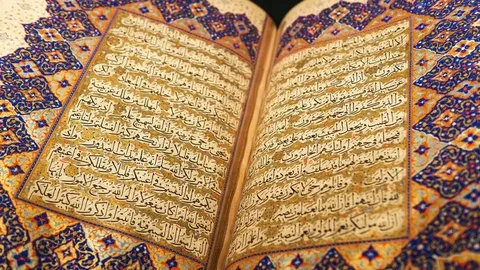Muhammad, peace be upon him, holds a central place in Islam, not only as the last prophet but also as the ultimate example for Muslims. Understanding what the Quran says about Muhammad helps Muslims better comprehend his role in their faith. The Quran is filled with verses that outline his mission, character, and the responsibility of every Muslim to follow him. in This article on Arabian Tongue we will explores what does the Quran say about Muhammad and why his message continues to resonate with over a billion people today.
Who Is Muhammad According to the Quran?

Muhammad is presented in the Quran as the final messenger sent by Allah to guide humanity. His primary role was to deliver Allah’s message to the people and to establish monotheism. His life, his character, and his mission all revolve around the teachings of the Quran. Muslims believe that Muhammad’s every action was guided by divine wisdom, making him a model for how to live a righteous life.
what does the quran say about muhammad
The Qur’an speaks about Prophet Muhammad (peace be upon him) in many places, highlighting his role as a messenger, his character, and his mission. Here are some key points about what the Qur’an says about Muhammad:
Muhammad as the Last Prophet
One of the most important roles that Muhammad plays in Islam is as the last prophet. The Quran emphasizes this repeatedly, making it clear that there will be no prophets after him. In Surah Al-Ahzab (33:40), the Quran refers to Muhammad as the “Seal of the Prophets,” affirming the finality of his prophethood. This concept is vital to understanding the role Muhammad plays in the Muslim faith—he is the completion of a long line of prophets, from Adam to Jesus.
The Character and Qualities of Muhammad
The Quran describes Muhammad as having an exemplary character. In Surah Al-Qalam (68:4), Allah says, “And indeed, you are of a great moral character.” This verse highlights his kindness, integrity, and patience. His character was not only for his time but serves as a universal example for all Muslims, encouraging traits like honesty, patience, humility, and generosity.
Muhammad’s Mission: To Deliver the Message of Allah
Muhammad’s mission, as outlined in the Quran, was to deliver the message of monotheism. Surah Al-Muzzammil (73:15) says, “Indeed, We have sent to you a messenger as a witness upon you just as We sent to Pharaoh a messenger.” His primary responsibility was to remind people of their Creator and to lead them towards worshiping Allah alone. His life’s work focused on guiding people toward a path of righteousness, justice, and compassion.
Read more: how many times is muhammad mentioned in the quran
Quranic Verses on Muhammad’s Struggles and Patience

Throughout his prophethood, Muhammad faced immense struggles, from the persecution by the Quraysh tribe in Mecca to the trials of leading a new community in Medina. The Quran acknowledges these struggles and offers him encouragement. In Surah Al-Inshirah (94:6), Allah says, “Indeed, with hardship comes ease.” This verse not only consoles Muhammad but also serves as a reminder to every Muslim that perseverance through trials will ultimately lead to relief.
The Compassion of Muhammad
The Quran emphasizes Muhammad’s merciful nature, especially in Surah Al-Anbiya (21:107), which states, “And We have not sent you, [O Muhammad], except as a mercy to the worlds.” His kindness extended not only to his followers but to all people, including those who opposed him. This compassion is a fundamental trait that Muslims are encouraged to emulate in their daily interactions.
Muhammad’s Role in Unifying the Ummah (Muslim Community)
The Quran portrays Muhammad as a unifier, someone who brought together different tribes and communities under the banner of Islam. In Surah Al-Hujurat (49:10), it says, “The believers are but brothers, so make settlement between your brothers.” Through his leadership, Muhammad was able to create a sense of unity among diverse groups, setting the foundation for the global Muslim community (Ummah).
Read about: birth of prophet muhammad
Muhammad as a Lawgiver
In addition to being a spiritual leader, Muhammad also acted as a lawgiver. Many Quranic verses refer to his role in establishing laws for the Muslim community. Surah Al-Ma’idah (5:48) emphasizes the importance of following both the Quran and the Sunnah, saying, “So judge between them by what Allah has revealed and do not follow their desires away from the truth.” This highlights Muhammad’s authority in laying down the legal and ethical framework for Muslims.
The Quran’s Defense of Muhammad
The Quran defends Muhammad against accusations and insults made by his opponents. In Surah Al-Hijr (15:95), Allah says, “Indeed, We are sufficient for you against the mockers.” This verse reassures Muhammad and his followers that divine protection is always with him, providing solace in times of hardship.
The Importance of Obeying Muhammad
Obedience to Muhammad is synonymous with obedience to Allah in Islam. The Quran clearly states this in Surah An-Nisa (4:80): “He who obeys the Messenger has obeyed Allah.” This demonstrates the close link between following the Prophet’s guidance and adhering to Allah’s commands.
Recommend: benefits of surah muhammad
The Prophet Muhammad in the Afterlife
The Quran hints at Muhammad’s elevated status in the afterlife, where he will have the ability to intercede on behalf of his followers. In Surah Al-Isra (17:79), it says, “It may be that your Lord will raise you to a praised station.” This verse refers to the role Muhammad will play on the Day of Judgment, where his intercession will be sought by the believers.
The Love and Respect Muslims Must Have for Muhammad
The Quran instructs Muslims to love and respect Muhammad deeply. In Surah Al-Ahzab (33:56), it says, “Indeed, Allah and His angels send blessings upon the Prophet. O you who have believed, ask [Allah to confer] blessing upon him and ask [Allah to grant him] peace.” This act of sending blessings upon Muhammad is a regular practice for Muslims, symbolizing their love and respect for him.
Quranic Examples of Muhammad’s Leadership
Muhammad’s leadership is exemplified in several key moments mentioned in the Quran. Whether it was leading the Muslim army in battles or negotiating peace treaties, the Quran highlights his wisdom and foresight. For example, in Surah Al-Fath (48:1), the Treaty of Hudaybiyyah is mentioned as a “clear victory” that eventually led to the peaceful spread of Islam.
FAQs
What does the Quran say about following Muhammad?
The Quran emphasizes that obeying Muhammad is akin to obeying Allah. In Surah An-Nisa (4:80), it is mentioned that obedience to the Prophet is essential for the faith of a Muslim.
Is Muhammad mentioned by name in the Quran?
Yes, Muhammad is mentioned by name in the Quran four times, including in Surah Muhammad (47:2).
What role does Muhammad play in Muslim prayer?
Muslims send blessings upon Muhammad during their daily prayers, asking Allah to grant him peace and blessings.
How does the Quran describe Muhammad’s mission?
The Quran outlines Muhammad’s mission as delivering the message of monotheism and guiding people to worship Allah alone.
What is the Quranic verse that mentions Muhammad as the last prophet?
Surah Al-Ahzab (33:40) refers to Muhammad as the Seal of the Prophets, affirming that no prophets will come after him.
Conclusion
The Quran provides a comprehensive picture of Muhammad’s role as a messenger, leader, and model for all Muslims. His life, as described in the Quran, serves as a blueprint for how to live a life of integrity, compassion, and faith. Understanding what the Quran says about Muhammad helps deepen one’s connection to the Prophet and inspires the believer to follow in his footsteps in both personal and communal life.


